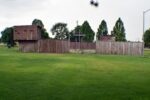| NAME | DESCRIPTION |
| FORT UTAH | Fort Utah was the original settlement at Provo, Utah, in the United States .It was established March 12, 1849. The original settlers were President John S. Higbee and about 30 families or 150 persons that were sent from Salt Lake City to Provo by President Brigham Young. The fort was first located west of town, but was moved to Sowiette Park in April 1850. In late 1849, tensions between Ute Indians and members of the Church of Jesus Christ of Latter-day Saints in Utah Valley escalated after a Church member killed a Ute known as Old Bishop, whom he accused of stealing his shirt. The Mormon and two associates then hid the victim’s body in the Provo River. Details of the murder were likely withheld, at least initially, from Brigham Young and other Church leaders. Settlers at Fort Utah did, however, report other difficulties with the Indians, including the firing of weapons at settlers and the theft of livestock and crops. Brigham Young counseled patience, telling them to “stockade your fort, to attend to your own affairs and let the Indians take care of theirs. Tensions mounted at Fort Utah after the Utes demanded that the settlers turn over the murderers. because the settlers refused to turn over those involved in the murder of Old Bishop to the Utes or to pay reparations for his death. In the winter of 1849–1850, a measles epidemic spread from the Mormon settlers to the Ute camps, killing many Indians and heightening tensions. At a council of ecclesiastical leaders in Salt Lake City on January 31, 1850, the leader of Fort Utah reported that the Utes’ actions and intentions were growing increasingly aggressive. In response, Brigham Young authorized a campaign against the Utes telling them to kill all the men and take the women and children captive. On February 8, 1850, a militia from Salt Lake surrounded a group of around seventy people at Big Elk. After two days of fighting, the Utes surrendered. The army killed the men and sent the women and children up to Salt Lake as prisoners. A series of battles in February 1850 resulted in the deaths of dozens of Utes and one Mormon. These events contributed to the Walker War. |
